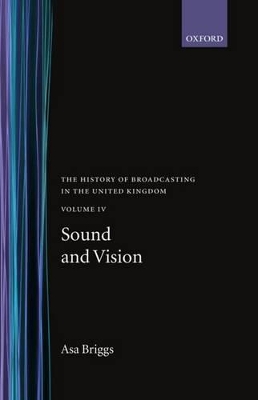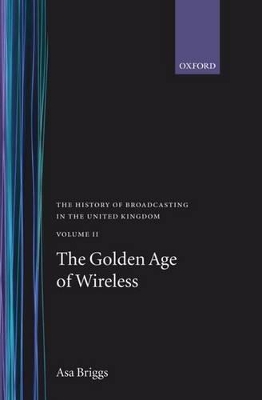History of Broadcasting
2 total works
The History of Broadcasting in the United Kingdom: Volume IV: Sound and Vision
by Asa Briggs
Published 1 February 1978
The ten years following the end of the Second World War were critical years in the history of British broadcasting. They witnessed the rise of television and the end of the BBC's monopoly. This fourth volume of Asa Briggs's detailed study is based on a mass of hitherto unexplored documentary evidence, much, but not all of it, from the BBC's own voluminous archives. It examines in detail how and why some of the key decisions affecting broadcasting policy - domestic
and external - were reached and what were their effects.
Yet it is more than an institutional history. One long chapter deals with the changing arts and techniques of broadcasting news and views, politics, drama, features and variety, music, religion, education and sport. It describes a pattern of broadcasting - and a society and culture - already remote from our own. At every point the main contours of society and culture are explored. It ends with the first night of competitive television and with contemporary assessments of the likely impact of
television on sound broadcasting and other media.
It is profusely illustrated and can be read either as complete in itself or as one fascinating phase in the unfolding history of British broadcasting.
and external - were reached and what were their effects.
Yet it is more than an institutional history. One long chapter deals with the changing arts and techniques of broadcasting news and views, politics, drama, features and variety, music, religion, education and sport. It describes a pattern of broadcasting - and a society and culture - already remote from our own. At every point the main contours of society and culture are explored. It ends with the first night of competitive television and with contemporary assessments of the likely impact of
television on sound broadcasting and other media.
It is profusely illustrated and can be read either as complete in itself or as one fascinating phase in the unfolding history of British broadcasting.
The History of Broadcasting in the United Kingdom: Volume II: The Golden Age of Wireless
by Asa Briggs
Published 23 March 1995
This is the second part of a projected four-volume history of broadcasting in the United Kingdom.
This volume covers the period from the beginning of 1927, when the BBC ceased to be a private company and became a public corporation, up to the outbreak of war in 1939. The acceptance of wireless as a part of the homely background of life and the acceptance of the BBC as the `natural' institution for controlling it distinguish this period from that covered in the earlier volume. From 1927 to 1939 the system of public control which had evolved from the early struggles was never seriously in
jeopardy and the one big official inquiry, the Ullswater Report, favoured no major constitutional changes. The main theme of the second volume, therefore, may be called the extension and the enrichment of the activity of broadcasting. Different chapters deal with the programmes and programme-makers;
the listeners and the ways in which their needs were (or were not) met as the system expanded; public attitudes to the BBC and the increasing complexity of its control and organization; the coming of television and the early experiments of Baird and others; and the retirement of Sir John Reith - not only the end of a regime but the end of an era. The volume ends with preparations for war.
This volume covers the period from the beginning of 1927, when the BBC ceased to be a private company and became a public corporation, up to the outbreak of war in 1939. The acceptance of wireless as a part of the homely background of life and the acceptance of the BBC as the `natural' institution for controlling it distinguish this period from that covered in the earlier volume. From 1927 to 1939 the system of public control which had evolved from the early struggles was never seriously in
jeopardy and the one big official inquiry, the Ullswater Report, favoured no major constitutional changes. The main theme of the second volume, therefore, may be called the extension and the enrichment of the activity of broadcasting. Different chapters deal with the programmes and programme-makers;
the listeners and the ways in which their needs were (or were not) met as the system expanded; public attitudes to the BBC and the increasing complexity of its control and organization; the coming of television and the early experiments of Baird and others; and the retirement of Sir John Reith - not only the end of a regime but the end of an era. The volume ends with preparations for war.

